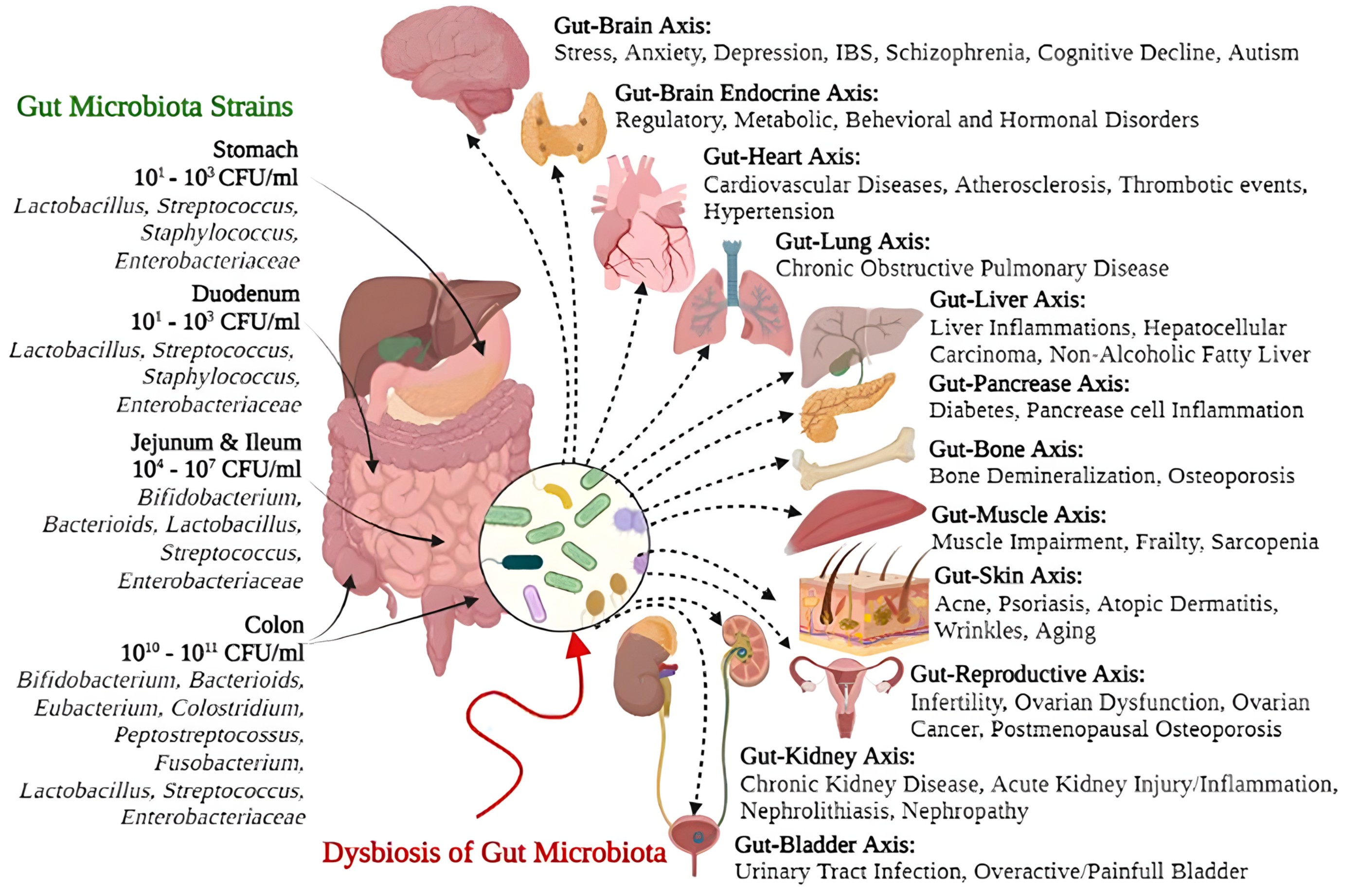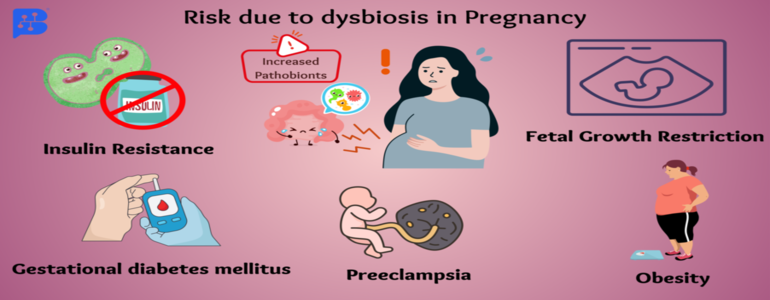- Jan. 10, 2024
- Siddhi Talgaonkar
- Microbiome and Lifestyle
New Year's resolution for a healthier gut
The year 2024 has already kick-started and we're sure there must be so many of you who have already made your New Year's resolutions and are ready to have an amazing year ahead! A New Year's resolution is a promise to yourself to do something differently, isn't it? Many of us set the resolution to make better lifestyle choices, to learn something new, to lose weight, to spend more time with family, and the list goes on.
But we all commonly need to set a New Year's resolution for a healthier gut! Gut health plays a vital role in everyone's life, as it impacts our overall health and well-being. So let's dive in to see why we need to make such a resolution in 2024.
Why make it?
Our gut microbiota - the system of microorganisms in a person's gastrointestinal tract-has been identified as an essential 'super-organism' in numerous scientific and clinical studies. This 'super-organism' is the diverse and dynamic range of the microbial ecosystem within our gut.
Every individual has a unique gut ecosystem consisting of more than 1000 species of microorganisms, predominantly bacterial species. This builds right after the birth of a child when the colonization of the gastrointestinal (GI) tract starts, and it evolves and changes over the individual's life. The adult human GI tract consists of several billion microbes, varying in composition along the length of the GI tract, demonstrating that certain bacteria tend to adhere to the mucosal surface while others are in the lumen (inside the tract). The bacteria at the mucosal surface, or what can be said as within the mucus layer, participate in the interactions with the host immune system, and those in the lumen are more likely to be involved in the metabolic interactions that are products of digestion. Our microbes are responsible for the metabolism of undigested food remnants as they help to digest dietary fiber and polyphenols. Also, they can supply essential nutrients, synthesize vitamin K, aid in the digestion of cellulose, and promote angiogenesis - the growth of blood vessels from the existing blood vessels. Thus, our unique gut composition supports our body's functions by breaking down the food we eat and absorbing the nutrients from it. To know your unique mixture of microorganisms in the gut, learn about our gut microbiome test, understand several factors about your health and wellness, and take advantage of our new year's 15% offer using coupon code: Flat15 !!
Sometimes, our gut may undergo abnormal changes or imbalances between the good and bad microbes, called dysbiosis, leading to many diseases with initial symptoms like bloating, abdominal pain, and diarrhea. The bacteria Anaerotruncus colihominis, Ruminococcus callidus, and Lachnospira pectinoschiza were highly observed in the bloating cases. An abundance of Bifidobacteria may have a negative correlation with abdominal pain. When there is a reduction in the number of members of the genus Streptococcus, diarrhea is observed. There are a few other highly observed diseases, like inflammatory bowel diseases, obesity, diabetes, liver diseases, chronic diseases, cancers, HIV, and autism, that show a correlation with the microbial composition of our gut.

Source :- Figure 1 - Gut microbial strains and negative health outcomes of gut microbial dysbiosis.
Source : Reference Paper [8]
The image above depicts the many species of microorganisms found in various parts of the GI tract. An individual's gut health is closely linked to the function of the heart, brain, kidney, muscle, bones, liver, lung, pancreas, and skin, among other vital organs. The image explains how the dysbiosis of the gut microbiota can impact each organ in the body, resulting in various issues and illnesses.
Benefits of a healthy gut
As we discussed, gut health not only affects your digestion activities but also your whole body. So, we can say that a healthier gut microbiome:
- Aids Digestion: Diverse gut bacteria facilitate complete digestion and nutrient utilization from complex carbs and proteins.
- Promotes Immune Health: A healthy gut flora acts as a defense against pathogens, releasing antimicrobial substances and preventing infections.
- Supports Bone Health: Beneficial bacteria in a healthy gut may enhance calcium absorption, contributing to overall bone health.
- Maintains Healthy Weight: A balanced microbiome plays a role in supporting a healthy weight, associating a diverse microbial composition with weight management.
- Promotes Brain Health: The gut-brain axis communication is influenced by certain gut microbes producing neurotransmitters, potentially impacting mood and cognition.
How do I plan the resolution?
Before planning for a healthier gut, we need to know what factors affect gut health. It is commonly known that our diet majorly affects the gut microbiome-not just diet, but our lifestyle, physical activities, genetics, age, gender, mental health, the medicines we consume, and the environment we live in can all have an impact on our gut.
Healthy food consumption: - Prebiotics and Probiotics
It is highly recommended to consume probiotics or live beneficial microorganisms for a healthier gut by the Food and Agricultural Organisation of the United Nations and the World Health Organization. Probiotics balance the gut microbiome and help stabilize microbial communities. Fermented foods and drinks are considered sources of probiotics, for example, yogurt, kefir, sauerkraut, tempeh, kimchi, miso, kombucha, kanji, some types of cheese, idli, dosa, buttermilk, pickles, and chutneys, the rare plant-based probiotic green peas, etc. According to many studies, fiber, a nutrient derived from plants, lowers the risk of metabolic illnesses by promoting the diversity and proliferation of beneficial bacteria in the gut. Foods like beets, carrots, garlic, banana, oats, onions, sweet potatoes, spinach, etc. are natural sources of fiber, also called prebiotics, that improve the gut flora. Whole grains are a great source of fiber, in addition to fruits and vegetables.
Exercise
Exercise benefits the microflora by enriching its diversity. The Firmicutes/Bacteroidetes ratio reflects the balance between two major bacterial phyla in the gut microbiome, influencing aspects of human physiology and gut health. Exercise improves the Bacteroidetes-Firmicutes ratio, which may help reduce weight and gastrointestinal disorders; encourages the growth of bacteria that can modulate mucosal immunity and improve intestinal barrier functions, which may help reduce the incidence of metabolic and obesity-related diseases; and encourages the growth of bacteria that can produce compounds like short-chain fatty acids that protect against gastrointestinal disorders and colon cancer. As a result, exercise may be used as a treatment to keep the gut in balance or to correct any dysbiosis that may develop, improving overall health.
Mental Health
Our mental health plays a very significant role in improving our overall well-being. A person with balanced mental health can be 10 times more efficient in their daily activities and can do better in their lifestyle. Research indicates a bidirectional communication between the central nervous system and gut microbiota, revealing the relationship between the gut microorganisms and the gut-brain axis. Anxiety and depression, two conditions that are becoming common in today's world, have been related to dysbiosis and inflammation of the stomach. The release of hormones during fear or anxiety can affect the gut flora, potentially aiding digestion while suppressing antibody production. So, hormonal imbalances can lead to various gastrointestinal disorders.
Foods containing fiber, vitamin D, proteins, and omega-3s can help boost the gut as well as mental health. Along with that, practicing mindfulness activities like meditation and yoga; mind-relaxing activities like music therapy, breathing exercises, and talking to our loved ones; having a good sleep schedule; and maintaining a work-life balance are important for good mental health.
Therefore, these three key elements-consumption of healthy food, regular exercise, and keeping our mental health a priority-all work together to support a healthy lifestyle and a longer, more productive life.
Based on these factors, you can plan for a healthier gut.
- Eating mindfully and maintaining a balanced diet with optimum amounts of good fats, plant carbohydrates and protein, prebiotics, and probiotics. Our BugSpeaks dietary recommendations are completely personalized for your gut, which ensures better healing of the gut.
- Avoid emotional eating. You can maintain a diary of how you feel before and after eating any food; that way, you can keep track of your cravings vs. your actual hunger!
- Avoid high-sugar, processed, and packaged food items. They may affect gut microbial balance, contribute to inflammation, and disrupt intestinal lining integrity, resulting in digestive disorders and a weakened immune system.
- Create a good schedule for each task you want to complete, and manage your time, as it promotes better digestion, lowers stress, and permits regular eating patterns and consistent meal planning. An organized schedule makes it easier to find time for rest and exercise, which supports a balanced lifestyle and intestinal health in general.
- Including some kind of physical activity in everyday routines as it improves gut health by increasing the diversity and number of healthy gut bacteria. Exercise increases the formation of short-chain fatty acids, which promotes a healthy gut environment, increases blood flow to the intestines, and aids in the regulation of bowel motions.
- Start journaling to calm your mind. Journaling offers a therapeutic outlet by recording thoughts and feelings, promoting emotional well-being that is linked to a better gut-brain connection.
- Getting at least 6-7 hours of sleep because it corresponds to the circadian rhythms of gut flora. A healthy sleep schedule helps the body's internal clock stay in sync, which controls a number of physiological functions, including the activity of gut microorganisms.
Our living conditions should allow us to preserve the harmony of the elements influencing our gut health.

Image 2- To do list for Healthier gut Resolution 2024
The above image displays the To Do List for the Healthier gut resolution of this year. Hydration and Exercise are a must for a good start. The diet should include the regular consumption of Prebiotics and Probiotics. Add the habit of Daily journaling and 6-7 hours of good sleep for Better Mental health.
Conclusion
Adopting a New Year's resolution for a healthy gut is a critical step that may have a big influence on overall well-being. The gut is home to a diverse microbial population that affects a wide range of human functions. Formulating a successful resolution requires an understanding of the components that impact gut health. In addition to food preferences, other important aspects include heredity, age, gender, physical activity, mental health, medicines, and environmental circumstances. For the best outcomes, a comprehensive strategy must be put into practice.
Beyond improved digestion, a healthy gut also affects immune system function, bone health, weight control, and even cognitive abilities. Making gut health a priority can benefit people's general health and wellbeing. Let our goals for 2024 represent a dedication to nourishing our "super organism" and discovering the numerous advantages that a healthy gut has to offer. Let us cheer for a year full of energy, perseverance, and success!
References
1. Quigley, E. M. (2013). Gut bacteria in health and disease. Gastroenterology & hepatology, 9(9), 560.
2. Aziz, Q., Doré, J., Emmanuel, A., Guarner, F., & Quigley, E. M. M. (2013). Gut microbiota and gastrointestinal health: current concepts and future directions. Neurogastroenterology & Motility, 25(1), 4-15.
3. Flint, H. J., Scott, K. P., Louis, P., & Duncan, S. H. (2012). The role of the gut microbiota in nutrition and health. Nature reviews Gastroenterology & hepatology, 9(10), 577-589.
4. Zmora, N., Suez, J., & Elinav, E. (2019). You are what you eat: diet, health and the gut microbiota. Nature reviews Gastroenterology & hepatology, 16(1), 35-56.
5. Jovel, J., Dieleman, L. A., Kao, D., Mason, A. L., & Wine, E. (2018). The human gut microbiome in health and disease. Metagenomics, 197-213.
6. Monda, V., Villano, I., Messina, A., Valenzano, A., Esposito, T., Moscatelli, F., ... & Messina, G. (2017). Exercise modifies the gut microbiota with positive health effects. Oxidative medicine and cellular longevity, 2017.
7. Clapp, M., Aurora, N., Herrera, L., Bhatia, M., Wilen, E., & Wakefield, S. (2017). Gut microbiota's effect on mental health: The gut-brain axis. Clinics and practice, 7(4), 987.
8. Afzaal M, Saeed F, Shah YA, Hussain M, Rabail R, Socol CT, Hassoun A, Pateiro M, Lorenzo JM, Rusu AV and Aadil RM (2022) Human gut microbiota in health and disease: Unveiling the relationship. Front. Microbiol. 13:999001. doi: 10.3389/fmicb.2022.999001









